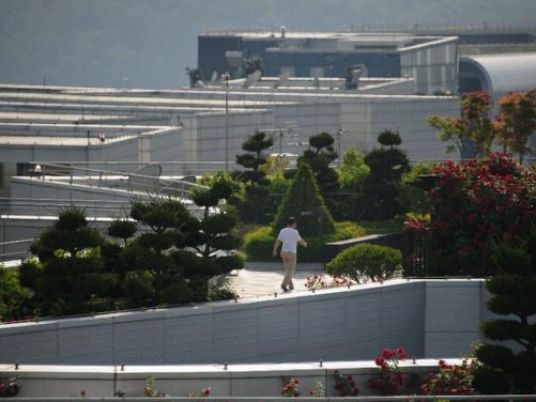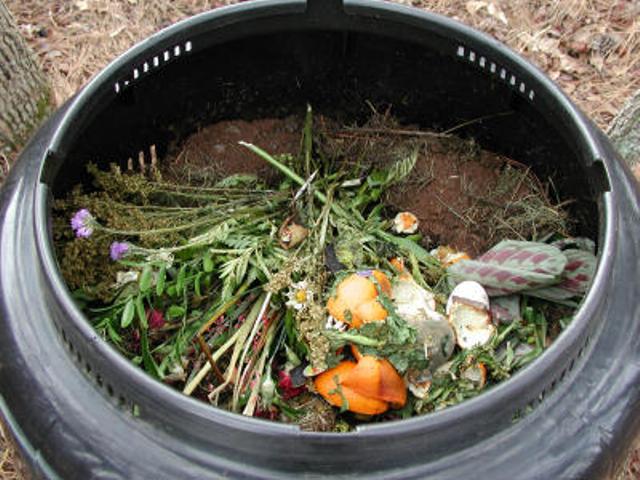As food prices increase and food security is a cause for concern, experimenting with organic food gardening is not only a relaxing hobby but also a way of saving money while eating healthy food.
The small art gallery Artellewa, located in the bustling residential district of Ard al-Lewa in northwest Giza, is hosting weekly workshops in collaboration with Dominique De Bruin, a South African permaculture specialist. During these weekly gatherings, attendees can learn how to set up small urban gardens and make use of their personal spaces – rooftops, balconies and private gardens – while getting tips on how to grow their own food.
In the session held last Friday, De Bruin explained to 15 aspiring and enthusiastic gardeners how to make compost. Eventually, every one of them will learn how to grow a rooftop garden, having received practical lessons on how to grow carrots, tomatoes, eggplants, spinach, lettuce, zucchini, as well as some walls of vertical plants.
Rania El-Abd, who participated in the workshop for the first time, works in environmental management. Like most of the others, she has never tried to grow her own food before.
“I’m very interested in adding this to my knowledge experience and making something new,” she explains. “Experiencing with your own hands is very different from reading about something. The workshop gives me the practical know-how, so I can make compost on my balcony and use it to grow plants or small vegetables plants.”
“Learning how to make compost is one of the most important steps because it helps the growth of vegetables and creates a healthy environment for plants,” De Bruin explains. However, “in Cairo compost is very expensive even though it’s very cheap to produce.”
A rooftop garden of moderate dimensions requires around one ton of compost, which costs about 500 LE. Therefore, one of the benefits of making your own compost is saving money. In addition, as the permaculture specialist explains, using compost instead of commercial fertilizer improves soil structure and and aeration, and increases the soil’s water-holding capacity. Compost loosens clay soils and helps sandy soils retain water; it stimulates healthy root development in plants, keeping the soil in a balanced condition.
The know-how provided by De Bruin requires direct participation of all attendees, who all need to have a contact with the matter.
“Mixing elements with your hands is really important, “ the specialist explains, “because there is a relationship with your consciousness and the living elements in the soil.”
Since a good compost is the best doctor for the soil, the specialist points out that it’s necessary to consider the balance between three major elements, namely nitrogen, phosphorus and potassium to reach the perfect mix of nutrients that plants need to grow, especially vegetables and fruits.
Phosphorus stimulates root growth; nitrogen is used to ensure the top growth of plants, especially the leafy ones; and potassium, which is best for the optimal development of fruits, also boosts the immune system of the plants.
The use of compost rather than chemical fertilizer enables the cultivation of organic and healthier vegetables since the latter destroys the positive microorganisms, making it harder for the plant to absorb water and compromising the plant’s immune system.
In the aerobic type of compost processing, the compost is made by three main elements: weed or green plant materials, dry or brown plant materials, such as dry leaves and small branches, and animal manure of cows, donkeys, horses, rabbits, sheep, poultry, excluding manure of cats or dogs. In addition, kitchen scraps – preferably uncooked – can also be used, making sure the quantity of salt is minimal, while meat, fish and bones should be avoided because they cause diseases and attract rats and flies to the compost.
The elements can be either piled up on the ground to break down or thrown in a composting bin that has ideal conditions to facilitate the process. Eventually, the compost can be used in the garden or in pots. In both cases, once all these elements are piled up, it’s necessary to add water and make sure the air can circulate. The composting process can take from four to six weeks.
You can find the video of the workshops and useful tips on how to create your own rooftop garden and grow your own food on the Artellewa Facebook group page.




